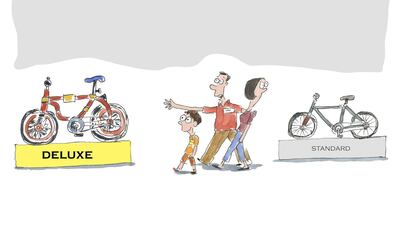My son and I were on the hunt for a bike. He has suddenly outgrown his wheels, and now wants to lean in to the adventure of off-road mountain biking, which calls for a very different machine to the one he has.
I’m all for the great outdoors and started the quest to get the "best" (for our phase of life) with a standard online search. You know the drill: you check out what’s recommended, why, what the price jumps give you in the way of kit and function. I’m sure many a parent becomes an accidental doctorate holder in whatever thing their child is into at a given time.
Armed with "facts", we set out to a place that would have the bikes he could try out for size, feel and fit.
It started so well and then it went terribly wrong.
Why? Because we’re human. Chatting to the expert on the shop floor meant we were exposed to even more information — and then, the clincher: trying out the goods led us to "better", more-expensive bikes.
Here’s the thing: they didn’t have the right sized frame in the two models we wanted to compare, which meant trying other bikes that were the correct size — models that were also at a significantly higher price-point than we’d discussed.
Understandably, the most expensive bike felt "amazing" and became the new reference point. Sigh.
This meant that all other bikes were then compared to this piece of magic in terms of price and performance.
It wasn’t just my son who was doing the comparisons, I was too.
“Oh, it’s ‘only’ Dh2,000 more than this much less brilliant bike.” It’s the kind of thinking that gets us all in trouble.
This, my friend, is the anchoring effect. It works as follows: you are exposed to a piece of information. This information primes you in a certain way. Then you’re given other pieces of information. You might think you are processing each bit of information independently — but alas, you’re not. Your cognitive bias refers back to what you were exposed to first, and compares against it when making decisions.
I could not believe we had fallen into the trap of using the first price tag as a reference — it was a novice mistake.
There's a well known experiment by psychology professor Dan Ariely that brings this to life. In his 2008 book, Predictably Irrational: The Hidden Forces that Shape our Decisions, Mr Ariely describes an experiment by Massachusetts Institute of Technology and Carnegie Mellon where he and his colleagues asked students to write down the last two digits of their social security numbers. The students were then asked to write down the highest bids they'd make on various items, such as a box of chocolates and a cordless keyboard. When the bidding was over, Mr Ariely asked the students if they thought they'd been influenced by their social security numbers. 'No' they replied.
Here’s what happened: students with social security numbers ending with the highest digits (80 to 99) bid 216 to 346 per cent more for each item than students with the lowest ending numerals (00 to 19).
Now think back to the last time you were shopping for a particular item, only to see a whopping price tag. It could be a gorgeous jacket for thousands of dirhams. You walk away (well done), but your brain doesn’t. It refers back to that big price tag when you see something else — and before you know it, you’re buying that something else, because you think it’s a ‘good deal’ — even though it’s a totally different product.
Here’s how you can be hooked and reeled in: you’re in the market for a car — or a bike. The sales person walks you past the fully loaded version of what you’ve enquired about. You might feel obliged to sit in (or on) said vehicle, because the sales person has invited you to do so. You love the feel, the perks. But not the price. You walk away. You then go to the next level down, and even though it’s still significantly higher than the budget you’d set, you start justifying the cost. All the while, you’re mind is referencing the anchor. The first price tag. This next one is a steal in comparison. Next thing, it’s yours.
With Black Friday, a day of shopping deals, on its way, be vigilant of your inherent human condition and the risk of anchoring bias ruining your finances for a significant time to come.
I, on the other hand, will be watching Black Friday like a hawk. My mission is to see if the highest-priced bike tried out is available at the price-range my son and I originally discussed. I hope I can pull myself away from any other financial carnage.
Simply sticking to your budget and freeing your brain up to move on is best. That’s when the first price tag has no power over you.
Nima Abu Wardeh is a broadcast journalist, columnist, blogger and founder of S.H.E. Strategy. Share her journey on finding-nima.com

